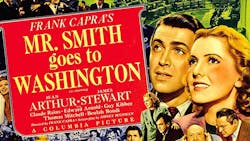When actor Jimmy Stewart died last month, it was as if one of the stars fell off the American flag.
His death at age 89 came only two days before the Fourth of July. It was appropriate, for he was a quintessential American hero: World War II bomber pilot and nice guy in the real world, and portrayer of such American icons as Charles Lindbergh, Glenn Miller and the fictional George Bailey in It's a Wonderful Life.
Ironically, however, as much as anyone else Jimmy Stewart may be responsible for the turnoff many American have toward their government and Washington. That's due to one of his most famous roles-the idealistic Jefferson Smith in Mr. Smith Goes to Washington. The film depicted politicians and the capital so negatively that members of Congress, Supreme Court justices, journalists, and other members of the capital establishment walked out of its premiere in Washington in October 1939.
The portrayal of a corrupt Washington stuck. With the exception of the patriotic World War II years, it seems that Americans have had a bad image of the capital ever since. I know. I work there — have, in fact, for a quarter of a century. But when I travel to the hinterland and identify myself as from Washington, I'm invariably subjected to sneers, expressions of disgust, diatribes about the ineffectiveness of the government, and the inevitable comment, "Why don't you shape things up down there?" I find it easier to say I'm from Arlington, Va., which is true. (Maybe they don't know Arlington is just across the river from the reviled capital and inside the infamous Beltway.)
Often I'll also mention that I'm originally from Ohio, which has a nice Midwestern ring of wholesomeness to it. The poor folks who live in Washington itself — in the District of Columbia — have no such recourse. When asked where they're from, they shuffle awkwardly, hang their heads, and mumble, "Washington," hoping that the questioner thinks they mean Washington state. The scorn of the capital is so pervasive that politicians find they can win elections by running against Washington.
They never did that, old-timers say, until Stewart brought Mr. Smith to the screen.
Funny thing about the anti-Washington feeling, though. As much as Americans say they hate the capital and what goes on there, they love to visit it. There's no better place to witness this ambivalence than at the annual Independence Day celebration on the Washington Mall. Nearly half a million people show up, most of them from out of town. They buy T-shirts emblazoned with the words "Washington, D.C." and eagerly snap photos of the Capitol building, the White House, and the monuments. Parents point proudly to the Capitol, its signature white dome glistening on a hilltop, and reverently explain to their children that the nation's laws are made there. And lumps form in their throats when the National Symphony breaks into "Stars and Stripes Forever" as fireworks burst in the night sky over the Washington Monument.
It's hard to explain this peculiar love-hate attitude toward Washington. Maybe deep in their hearts, Americans realize that they can complain about their government — something they can't do in some countries and live to tell about it. Perhaps subconsciously, they're grateful for that.
It's called freedom. And they realize that their system of government — for all its gridlock, frequent intrusiveness, failed programs, campaign-finance scandals, wasteful spending, partisan bickering, and other imperfections — basically works.
This year, when all those Washington Mall Independence Day celebrants returned to their hotel rooms, they received a stunning demonstration of just that. Turning on their TV sets, they were greeted by pictures from Mars, beamed from millions of miles away by NASA's remarkable robot Sojourner.
The Mars mission is a staggering governmental accomplishment — a shining example of what a benign government working cooperatively with a robust private sector can do. And the landing occurred on July 4 — part of a triangulation of events that included the Washington Mall celebration and, two days earlier, Jimmy Stewart's death.
It says much of what America is all about.
